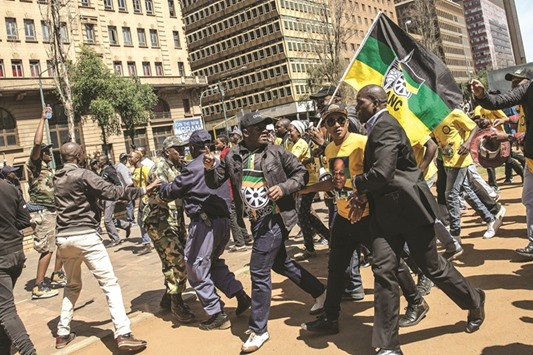Activists from rival factions of South Africa’s ruling ANC faced off in Johannesburg yesterday, highlighting deep divisions in the party as pressure grows on president Jacob Zuma.
The ANC, which led the struggle to end apartheid, has been rocked by poor results in last month’s local election largely blamed on Zuma’s leadership and the country’s mounting economic woes.
Police patrolled outside the ANC’s Luthuli House headquarters in central Johannesburg after some party activists vowed to occupy the building in protest at how the party and the government are being run.
As about 40 anti-Zuma protesters gathered nearby, other ANC members loyal to the president pledged to defend the building.
Among those backing Zuma were scores of camouflage-wearing members of the Umkhonto we Sizwe (MK) veterans association, the former armed wing of the ANC.
Gwede Mantashe, the ANC’s influential secretary general, addressed the crowd briefly and received a petition from the anti-Zuma group.
He urged supporters not to resort to violence and to allow the protests “to fizzle out”.
“Don’t try to beat them up...
don’t give them publicity,” he said.
“There should be no bloodshed.
You have defended the organisation, you have defended Luthuli House.
I am appealing to you, comrades.”
The march by the party’s own members was a rare protest action against the leadership, but criticism of Zuma has been growing over the last year.
“We lost (control of some cities in the local elections) because of the corruption of Jacob Zuma,” Mary Louw, one frustrated ANC member, told AFP.
“We need a leadership who doesn’t promote corruption.”
Zuma, 74, who was jailed on Robben Island with Nelson Mandela during apartheid, retains strong loyalty within the party especially in rural areas, but he could step down before the next presidential election in 2019.
“I’m here to defend my president.
Who’s got the proof that Zuma is corrupt? He’s my president until the end of his term,” Cecilia Lindiwe Ximba, a Zuma loyalist, told AFP.
“They have the right to demonstrate, but they only spread rumours.
They must wait until he finishes his term.”
An unemployment rate of 27% and GDP growth at zero % this year have added to Zuma’s troubles, as frustration builds among poor black communities seeing few improvements since white-minority rule fell in 1994.
In August’s municipal elections, the ANC lost control of Johannesburg, the country’s largest city and its economic centre, as well as the administrative capital Pretoria.
The opposition Democratic Alliance (DA) now runs four major cities, including tourism hub and legislative capital Cape Town.

South African ruling party African National Congress president and national executive committee supporters chase disgruntled members demonstrating outside ANC headquarter in Johannesburg, South Africa.
